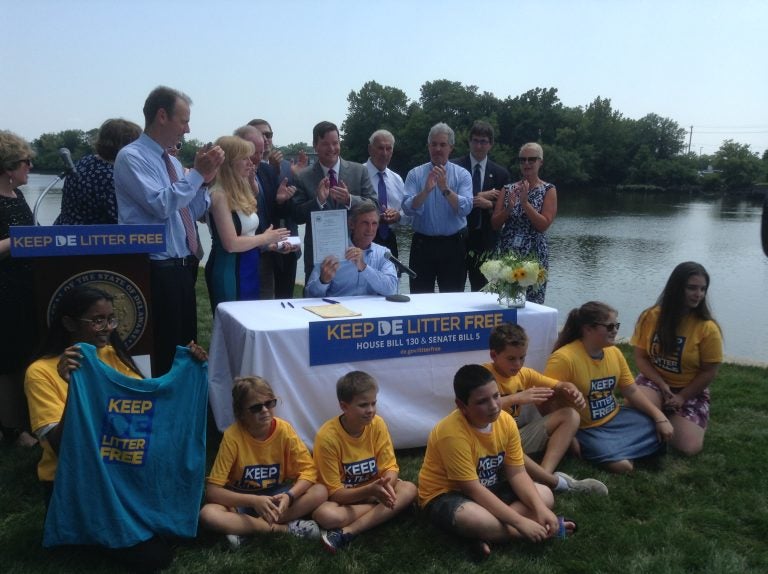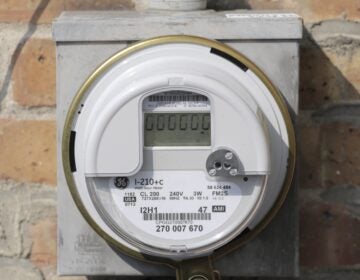Delaware bans plastic bags for large stores beginning in Jan. 2021
The new law bans plastic bags from stores with more than 7,000 square feet of retail space and chain stores with three or more locations with at least 3,000 square feet each.

Delaware Governor John Carney signs into law a partial plastic bag ban (Zoë Read/WHYY)
Moving to protect sea animals, wildlife and humans from the effects of litter, Delaware Gov. John Carney signed legislation Monday to limit the availability of single-use plastic bags.
The new law, which takes effect Jan. 2021, bans plastic bags from stores with more than 7,000 square feet of retail space and chain stores with three or more locations with at least 3,000 square feet each.
Those stores could sell reusable bags, or provide paper bags at no cost or a cost of their discretion.
Large retail stores in Delaware currently are required to have an onsite recycling receptacle so customers can dispose of their plastic bags responsibly. But it’s not clear how often customers take advantage of those recycling bins.
Plastic bag litter remains a problem. Last year, volunteers collected 1,946 plastic bags during the state’s annual Coastal Cleanup Day.
“Much of this is human behavior,” said state Rep. Gerald Brady, D-Wilmington, who sponsored the bill. “In many ways, the legislation changes the rules and regulations. But we’re trying to send a clear message to modify our behavior, particularly when it comes to plastic.”
Stores that violate the new law will face a civil liability or administrative penalty up to $500 for the first violation, up to $1,000 for the second violation, and up to $2,000 for the third, and each subsequent, violation.
Opponents of the law say using paper bags will raise business costs, and in turn increase prices for customers.
However, supporters, like Plastic-Free Delaware founder Dee Durham, say plastic bags have a bigger cost on the environment, animals and humans.
Durham, also a New Castle County Councilperson, hopes future legislation will be enacted to also ban paper bags in favor of reusable ones.
“The flipside of the economic argument is the huge impact of cost to community members, tax paying citizens because of cleanup costs, roadside cleanups, storm water cleanups, and it’s very difficult to measure the health impacts,” she said.
“It’s proven we’re all eating plastic every day and it’s proven to be cancer causing. Those costs are immeasurable, I don’t know how you can measure a health environment,” she said.
The bill makes exceptions for bags used to wrap meat, fish, flowers or potted plants or those that contain unwrapped food items. Bags containing live animals, those that transport chemical pesticides or cover articles of clothing on a hanger also are exempt.
The legislation also leaves cities with more than 50,000 residents the option of enacting a stricter law to require stores in excess of 500 square feet to comply with the ban.
Plastic bag bans have been enacted in three other states, and several major cities also have similar laws.
WHYY is your source for fact-based, in-depth journalism and information. As a nonprofit organization, we rely on financial support from readers like you. Please give today.





